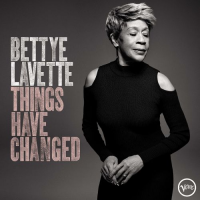Home » Jazz Articles » Live Review » Dixie Dregs at the Boulder Theater
Dixie Dregs at the Boulder Theater
Boulder Theater
Boulder, CO
April 14, 2018
In 1979, the Dixie Dregs came to my hometown, shortly after the release of their album Night of the Living Dregs (Capricorn, 1979). They were the opening act for Pure Prairie League, a country rock band. The Dixie Dregs' set was a spectacle. Their smoke generators worked overtime, several flash-explosions punctuated the set. At one point, at the pinnacle of the frenzy, the bassist picked up a long neck beer bottle from atop an amplifier and smashed it over his bald head. Of course it was a prop, but it made for several micro-seconds of horror. All of this went on while the band laid down an intense, virtuosic performance of jazz-rock that left the audience nearly stunned and exhausted. Then, Pure Prairie League came on stage, gently strumming their acoustic guitars and singing about "Amie" in three part harmony. I found it difficult slump down in my seat far enough.
Later that evening, my roommate, who had attended the show with me, and I stopped by our neighborhood bar for a couple games of pool before heading home. While we were shooting pool, the Dixie Dregs walked in and settled into a pool table of their own. Roommate and I debated about whether to talk to them. We debated so long, the band eventually left. We departed shortly afterward and as we were walking through the parking lot, we noticed a van that seemed to be full of people. We walked by the van and saw the driver's window was down and in the driver's seat was Steve Morse, composer, leader and guitarist of the band. Well, we had to stop and talk at that point. We noted that the Dregs pretty much blew away the headliner that evening. Morse replied that they had been having that problem and, in fact, they were banned from opening for several groups who didn't like being upstaged.
Fast forward about forty years; the Dixie Dregs are at it again. This time they're not opening for anyone and no one is opening for them. They have the stage to themselves. The plumes of smoke? The explosions? The beer-bottle-over-the-head? All gone. Saturday night at the Boulder Theatre, it was unadulterated Dregs; five world-class musicians playing like few others can. The show was the second of a two night stand in Boulder. When the Saturday show had quickly sold out, a second show on Friday night was added.
The band certainly hasn't been together all this time. They first split up in the early '80s, but they've come together a few times over the years for reunion tours. Some members stayed in music while others went in completely different directions. Violinist Alan Sloan went to medical school and has been a practicing anesthesiologist for thirty years. Bassist Andy West went to Arizona to work in the software industry. Guitarist Morse has done stints with both Kansas and Deep Purple. Drummer Rod Morganstein was a founding member of Winger and keyboard man Steve Davidowski stayed active by playing with bands in North Carolina.
The set list drew from most of their albums which were released in the late '70s and into the '80s. The Dixie Dregs didn't spend much time on the radio, even during their heyday, but still, some tunes were heard more than others. Saturday night, the band played most of the more "popular" tunes as well as many that were more obscure. "Take It Off the Top," "Odyssey," "Country House Shuffle" and the closer before the encore, "Cruise Control" were just like hearing from a long lost friend. Other tunes from the old days included "Twiggs Approved," "What If," "Wages of Weirdness" and "Bloodsucking Leaches." Those kinds of titles make you wish these songs had lyrics.
Bassist West served as the emcee for the evening, introducing some of the songs and marveling at how people were still so enthusiastic about their music. Violinist Sloan took the mic at the start of the second set to express his gratitude and wonder at being able to play the music after all these years for such an appreciative audience. He then gushed about Boulder and what a great town it was. He exclaimed that if he could shake away from his current environment, he would move to Boulder. At that point, several in the audience replied, "You can't afford it!" Come on, he's an M.D. Well, maybe it would be a problem even so. Boulder and all. Sloan followed up his monologue with a solo violin piece that he wrote for his daughter.
Morse was next up at the mic to discuss how many radio stations had been talking to him about how they would like to have more chamber music to play on the air. It was all an introduction to the tune "Go for Baroque." As the name implies, the tune was straight from the 17th Century and featured Morse on an acoustic guitar with Sloan on his violin. West played his electric bass even though that instrument wasn't invented for several hundred years after the music in question. Nevertheless, Bach was present in the room. The Dregs had always dabbled in various forms of classical music to go along with their mix of jazz, rock and country.
Despite the lack of real pyrotechnics, the musical fireworks intensified as the second set culminated with "The Bash" followed by "Cruise Control" which closed the set, before the encore. "The Bash" is the Dixie Dregs' version of the country standard "Wabash Cannonball" and is a competitive solo vehicle with lick trading and continual shots at one-upsmanship. With the kind of horsepower in this band, this kind of thing could soon be outlawed because of its contribution to global warming. "Cruise Control" swapped out the country motif for a steady rock foundation and a driving bass line.
Forty years after the smoke, the explosions and breaking beer bottles, the Dixie Dregs can still play and they have the confidence and reputation to just rely on their musicianship. And the audience still loves it.
Tags
Live Reviews
Geoff Anderson
United States
Colorado
Denver
Steve Morse
Alan Sloan
Andy West
Rod Morganstein
Steve Davidowski
PREVIOUS / NEXT
Support All About Jazz
 All About Jazz has been a pillar of jazz since 1995, championing it as an art form and, more importantly, supporting the musicians who make it. Our enduring commitment has made "AAJ" one of the most culturally important websites of its kind, read by hundreds of thousands of fans, musicians and industry figures every month.
All About Jazz has been a pillar of jazz since 1995, championing it as an art form and, more importantly, supporting the musicians who make it. Our enduring commitment has made "AAJ" one of the most culturally important websites of its kind, read by hundreds of thousands of fans, musicians and industry figures every month.
Go Ad Free!
To maintain our platform while developing new means to foster jazz discovery and connectivity, we need your help. You can become a sustaining member for as little as $20 and in return, we'll immediately hide those pesky ads plus provide access to future articles for a full year. This winning combination vastly improves your AAJ experience and allow us to vigorously build on the pioneering work we first started in 1995. So enjoy an ad-free AAJ experience and help us remain a positive beacon for jazz by making a donation today.Near
Denver Concerts
Feb
20
Fri
























